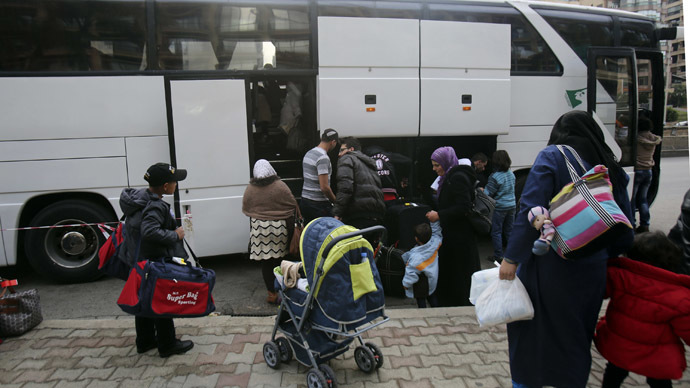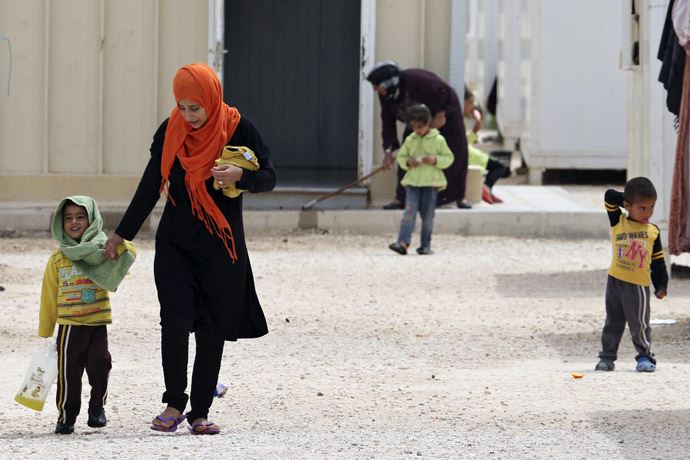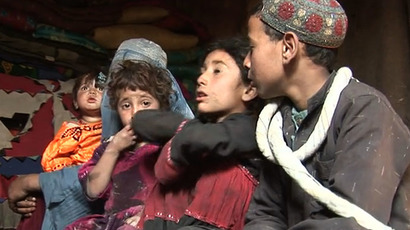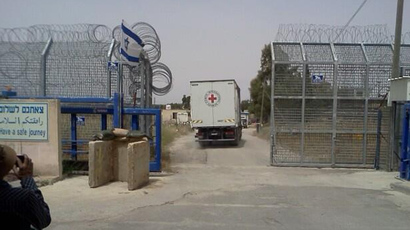World refugees top 50m in 2013 – worse than in WWII

The number of people who fled their homes across the globe in 2013 is over 50 million for the first time since World War II, a new UN report says. Amnesty International blamed the UN for ineffective or delayed responses to ongoing conflicts.
In total, there were registered 51.2 million refugees, asylum seekers and internally displaced people last year. On average, 32,200 people fled their homes each day, according to the report by the UN High Commissioner for Refugees, titled “War’s Human Cost.”
"We are witnessing a quantum leap in forced displacement in the world," António Guterres, head of the UN's refugee agency, told The Guardian.
A total of 16.7 million people are refugees. Apart from 5 million Palestinians, Afghans, Syrians and Somalis are 50 percent, with the main host countries Pakistan, Iran, Lebanon, Jordan and Turkey.
Then, about 1.2 million people sought asylum to mostly developed countries, and Germany was the largest recipient. Most of the asylum seekers were from Syria, Democratic Republic of Congo and Myanmar.
Finally, internally displaced people were a historic 33.3 million people – forced to flee their homes, but staying within their country’s borders.
Over 50 percent of the refugees are children, with many of them traveling alone and some falling into the hands of human traffickers – that’s according to the UNHCR annual global trends report, issued Friday.
More than 25,000 children asked for asylum in 77 countries last year, and according to the document, it’s just a small percentage of the number of displaced children around the world.
The main causes for the jump in figures are climate change, population growth, urbanization, food insecurity and water scarcity. In many cases, the causes are combined with each other.
The increase can also be accounted for armed conflicts: the jump in 6 million people back in 2012 was triggered by the Syria war, with 2.5 million Syrians fleeing the country and 6.5 million internally displaced. Those are over 40 percent of the country’s population.

The data showed "a world where peace is dangerously in deficit," Guterres said.
“That peace deficit represents the incapacity of the international community firstly to prevent conflicts and secondly, to find solutions to those conflicts," he added.
Guterres provided the example of the Nigerian conflict when "the international community has shown very little capacity to do something useful to prevent it from getting worse and more dangerous."
The report comes as the world marks global Refugee Day, and Amnesty International blamed the UN Security Council for the surge in refugees.
The organization called on Security Council members to take more decisive action in order to protect civilians and avoid millions more people being driven from their homes.
“Apathy, political alliances and point-scoring must cease trumping human rights concerns when it comes to decision-making at the Security Council,” said Sherif Elsayed-Ali, Deputy Director for Global Issues at Amnesty International.
“While diplomats debate points of order, houses are being burned to the ground and families forced on the run. Long delays and vetoed resolutions are plaguing the supposed ‘strong arm’ of the UN,” he added.
In particular, the delayed deployment of UN peacekeepers to the Central African Republic led to thousands being forced to flee before troops arrived, Amnesty International reported. Also, the repeated failure of the Security Council to transfer the situation in Syria to the International Criminal Court and the ensuing lack of accountability has triggered the world’s largest displacement crisis, the organization said.
Last year, at least 435,000 people asked for asylum in the EU, but just 136,000 people were granted it.
“The globe’s self-styled leaders are lagging far behind the developing world when it comes to bearing the burden of the global refugee crisis,” Sherif Elsayed-Ali said.
“Given the economic advantages rich countries have over poor, it’s doubly shocking to see them shirking their responsibility to protect refugees to such a ludicrous extent – this must end,” he added.














